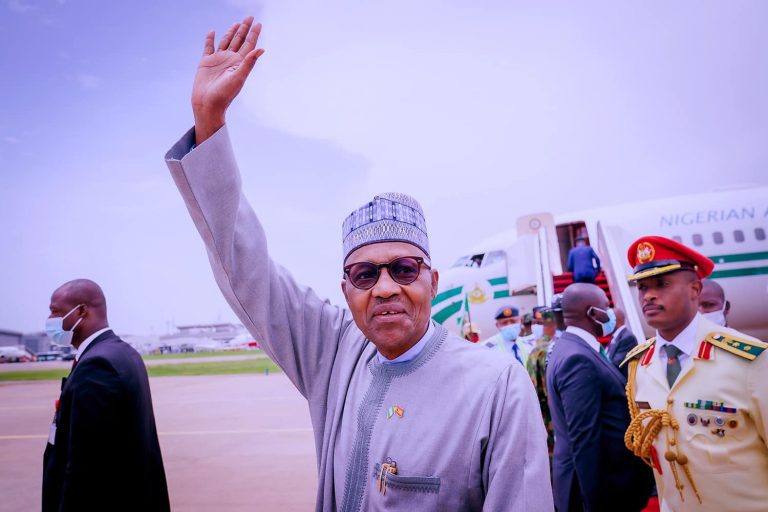Muhammadu Buhari dies at 82: A soldier-turned-democrat bows out in London

Muhammadu Buhari returns back to Nigeria after testifying in $2.3bn Mambilla Power corruption case. Photo: Courtesy
Nigeria’s former president, Muhammadu Buhari, has died in London at the age of 82 following a prolonged illness, the presidential press office confirmed late Sunday. Buhari, a towering figure in Nigeria’s political landscape for over four decades, passed away at 4:30 p.m. local time in a private clinic, where he had been receiving treatment after falling ill during a medical trip in April.
President Bola Ahmed Tinubu, his successor and once a powerful ally, offered condolences to Buhari’s widow, Aisha, and dispatched Vice President Ibrahim Masari to the UK to oversee the return of the late leader’s body.
From Daura to Dodan barracks: The early path
Born in December 1942 in the dusty town of Daura, Katsina State, Muhammadu Buhari’s journey from the remote north to the national stage was shaped early by military discipline and political turbulence. Orphaned of his father at four, Buhari’s upbringing under a Kanuri mother instilled a stoic resilience that would later define his public persona.
After receiving military training in Nigeria, the UK, India, and the US, Buhari’s national profile soared following a 1975 coup that toppled General Yakubu Gowon. He was appointed military governor of Borno State a region now synonymous with Boko Haram violence and later, as oil minister under Gen. Olusegun Obasanjo’s military regime, he oversaw Nigeria’s most vital economic asset.
The soldier who took power and paid the price
On December 31, 1983, Major-General Buhari emerged as Nigeria’s new military head of state after a coup against President Shehu Shagari. Promising to restore “discipline” and stamp out corruption, Buhari launched his infamous “War Against Indiscipline,” which saw public frog jumps, media censorship, and mass detentions.
But the iron-fisted rule that built his reputation also precipitated his fall. On August 27, 1985, General Ibrahim Babangida ousted him in a bloodless coup, sending Buhari into 40 months of detention and political obscurity.
From dictator to democrat: A return to the ballot
Following decades of silence, Buhari re-emerged in 2003, this time dressed not in khaki but in flowing agbada as he launched a bid for the presidency.
It would take three failed attempts before the tide turned in his favour. In 2015, riding a wave of popular frustration with corruption and insecurity, Buhari made history by becoming Nigeria’s first opposition candidate to unseat an incumbent president.
His promise? To fight corruption, crush insurgency, and revive Nigeria’s struggling economy.
A mixed presidential legacy
Despite his personal reputation for austerity and incorruptibility, Buhari’s eight years in office were marred by contradiction. He cracked down on corrupt elites but struggled to build strong institutions. He banned rice imports to boost local farming, yet food prices skyrocketed. Under his watch, Boko Haram fractured but survived, and new threats like banditry and mass abductions surged in Nigeria’s north.
Economic hardship deepened as global oil prices plunged. Inflation soared. Youth unemployment became a national crisis.
The “Baba Go Slow” moniker—initially a joke about his delayed cabinet appointments eventually came to symbolize the frustrations many Nigerians felt under his leadership. His 2019 re-election was less a victory than a confirmation of political inertia.

Health, Absence, and Controversy
A recurring subplot in Buhari’s presidency was his health. Frequent trips to London for treatment kept largely shrouded in secrecy, prompted speculation and concern. Critics accused his administration of lacking transparency, especially on matters of national importance.
In a particularly controversial episode during the 2023 election season, Buhari’s government introduced a naira redesign policy that led to a cash shortage nationwide. While officially framed as a bid to reduce vote-buying, many believed it was a subtle attempt to undermine Bola Tinubu’s presidential bid. If true, it failed, Tinubu won with 37% of the vote in a bitterly contested race.
The man behind the myth
Away from politics, Buhari was a reserved figure, often described as detached, even aloof. He married twice and fathered ten children. His second wife, Aisha Buhari, occasionally became a vocal critic of his leadership, famously warning in 2016 that she might not support his re-election.
For some, he remained a disciplined icon of integrity. For others, he was an inflexible relic of the past, unable to adapt to the complexities of democratic governance.
A final salute
In death, as in life, Muhammadu Buhari will evoke sharply divided opinions.
To his supporters, he was a principled patriot who never wavered in his fight against graft. To his critics, he was a leader who promised change but delivered hardship, whose silence spoke volumes in moments that cried out for action.
Yet few can deny that he was a central figure in Nigeria’s post-independence story. From coup plots to the campaign trail, from martial boots to ballot boxes, Buhari’s life was a mirror of Nigeria’s evolving but troubled democracy.
His body will return home in the coming days, where he will be buried in accordance with Islamic rites in his hometown of Daura.
May he rest in peace.




